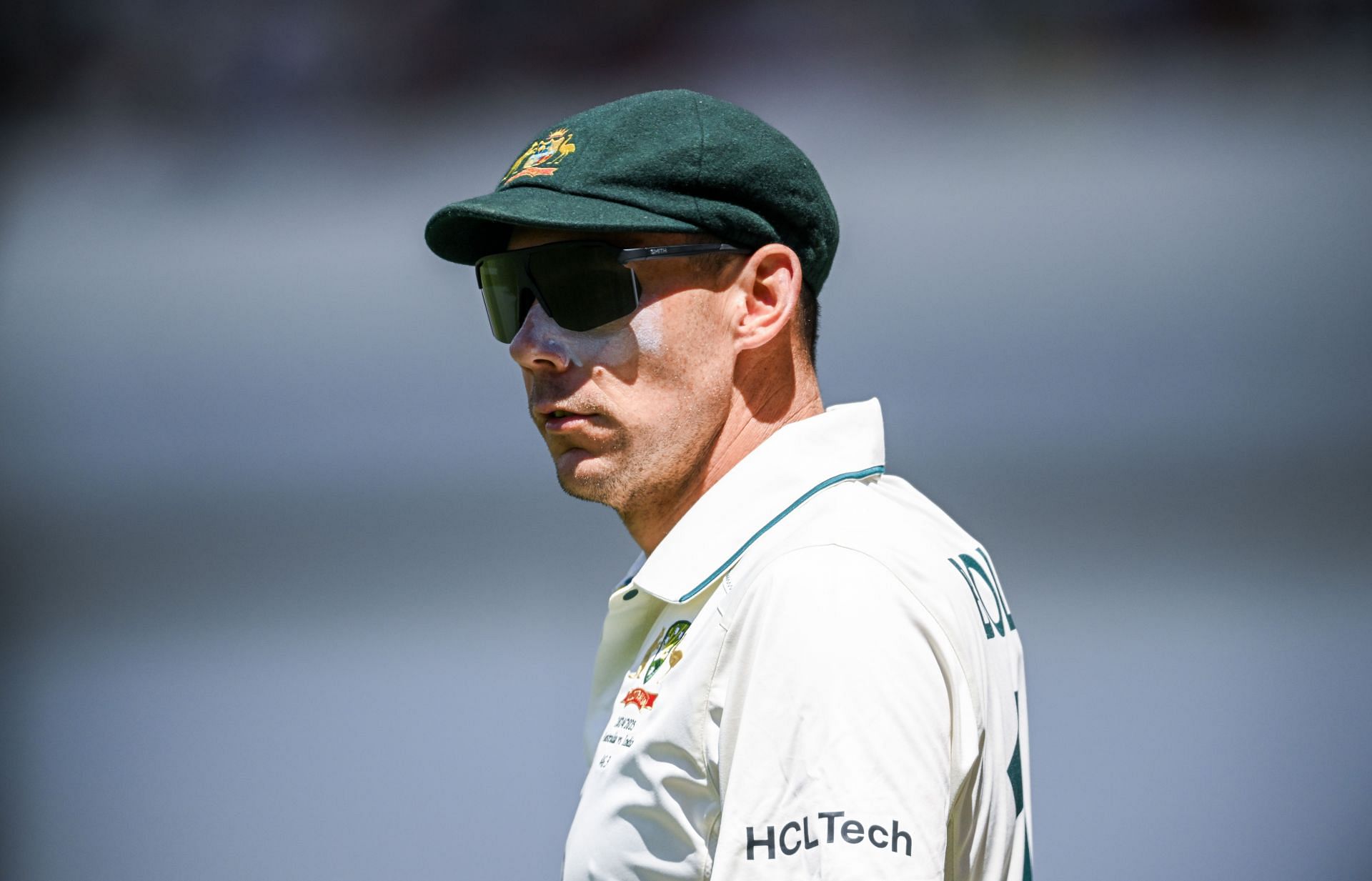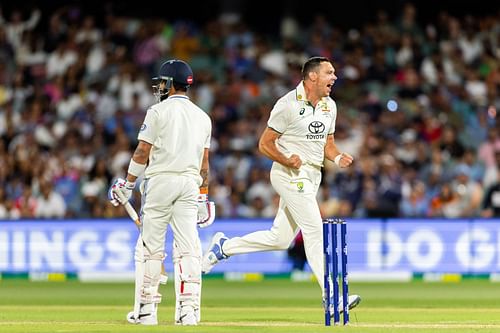
Is Scott Boland the unluckiest cricketer to play for Australia?
Surprise, Surprise, Scott Boland misses out for Australia the game after producing a match-winning effort with the ball. How often have we seen this transpire over the past three years? Plenty, with the latest being the ongoing third Test against India at Brisbane.
After replacing the injured Josh Hazlewood for the second Test in Adelaide, Boland produced what he always does in home Tests - 'Magic'. The 35-year-old picked up five crucial wickets across the two innings to help Australia level the five-match series with a thumping ten-wicket victory.
Yet, with Hazlewood fit, Boland is back warming the benches for the all-important Brisbane outing.
Australian skipper Pat Cummins called it unfortunate for Boland to repeatedly miss out on the playing XI in the press conference on the eve of the third Test.
"It's tough [leaving him out], he was fantastic in Adelaide. Unfortunately, he spent quite a bit of time on the bench over the last 18 months and whenever he plays, he's fantastic. Shame for Scotty, but still a fair bit to play out in the series so I'd be surprised if he doesn't get another crack at some point," he said.
As Boland watches the action from the outside for an umpteenth time, here is why he should deem himself extremely unlucky.
Boland's Test numbers scream 'unlucky'

Let's first get Scott Boland's historic Test numbers out of the way. The ever-reliable right-arm pacer has picked up 40 wickets in only 11 Tests at a stunning average of 20.42.
Boland produced remarkable figures of 6/7 in the second innings of his debut Test against England in 2021. The Victorian boasts even better numbers at home, picking up 33 wickets at an extraordinary average of 13.54 in seven Tests.
Boland has also made a massive impact on team success, with Australia winning eight out of his 11 Tests (2 losses, 1 draw). Much like the Adelaide Test of the ongoing series, Boland replaced Hazlewood in the World Test Championship (WTC) final against India last year.
Unfazed by the big occasion, he stepped up to the plate with match figures of 5/105 to help Australia add another ICC trophy to their cabinet. Boland has also done the hard yards consistently in first-class cricket, picking up almost 400 wickets at an average of under 25 in 108 games.
Having said all of this, Australia has almost always boasted an embarrassment of riches when it comes to bowlers - a key factor behind their seemingly everlasting dominance.
Hence, Boland isn't alone on the 'Unlucky' list among Aussie players, with many former stars suffering a similar fate.
Other Australian bowlers who suffered 'Benchwarmer' Boland's fate
![Stuart MacGill boasted better numbers than Nathan Lyon but played less than 50 Tests [Credit: Getty]](https://staticgf.sportskeeda.com/editor/2024/12/22e61-17341685156360-1920.jpg)
Excelling in almost every opportunity and still making way for a most established bowler isn't anything uncommon in Australian cricket. The dominant 2000s era of Australian cricket had several bowlers suffer a similar fate to Boland.
Let us start with the ultimate example - former leg-spinner Stuart MacGill. The Western Australian could have easily become an all-time great if not for the looming presence of the late Shane Warne.
With their careers predominantly coinciding, MacGill played second fiddle to Warne throughout. The now-53-year-old would play on the rare occasion Australia played two spinners in a Test match or in the unfortunate scenario of Warne being injured.
Despite these circumstances, MacGill held his own and finished with remarkable numbers - 208 wickets at an average of 29.02, with 12 five-wicket hauls in 44 Tests. For context, Australia's No.1 spinner over the past decade, Nathan Lyon, averages 30.40 in his 141 Test outings.
MacGill even impressed in his three ODI appearances, picking up six wickets at an economy of 17.50 and an economy of 3.50.
Coming to the pace department, Australia was led tremendously for most of the 2000s by Glenn McGrath, Brett Lee, and Jason Gillespie. It meant several other pacers like Andy Bichel, Michael Kasprowicz, and Stuart Clark, among others, were waiting on their rare opportunities to showcase their abilities.
Despite picking up an incredible 769 first-class wickets, Bichel played only 19 Tests for Australia. The fiery pacer helped Australia win the 2003 ODI World Cup with several game-changing performances but still managed to play only 67 50-over matches for them.
Kasprowicz boasted an outstanding average of 24.98 in ODIs and 11.40 in T20Is, yet, played a combined 81 matches across the two formats. He played a key role in Australia achieving their 'final frontier' by defeating India in India in the 2004 Test series but played only 38 red-ball games for Australia.
The most glaringly unlucky Australian pacer was Stuart Clark, who excelled in all three formats despite limited opportunities. The tall right-arm pacer averaged a remarkable 23.86 in Tests but played only 24 matches because he debuted at only age 30.
Clark also averaged 27.86 and 18.23 in ODIs and T20Is, yet, played a combined 48 matches only across the two formats. The endless list of former Australian bowlers boasting goddy numbers but suffering from the 'problem of plenty' goes on and on.
Contrasting misfortunes of the two H's that connect 'unlucky' Aussie batters
![Brad Hodge's career will forever remain an enigma in Australian cricket history [Credit: Getty]](https://staticgf.sportskeeda.com/editor/2024/12/d5b53-17341685901312-1920.jpg)
Much like the bowlers, several former Australian batters have either received opportunities late or suffered the axe routinely despite impressive performances.
The two best pieces of evidence for both cases - the two H's, Brad Hodge and Michael Hussey. While the former inexplicably played only six Tests despite scoring a sublime double century, the latter was another one of the long list of Australian batters that couldn't break into the lineup.
The stylish Hodge scored a half-century on his Test debut in 2005, followed by a sensational 203* two games later against South Africa in Perth. Yet, he played only three more Tests for Australia in his career.
Hodge even scored a defiant 67 in his final Test outing against the West Indies in 2008. An average of 55.88 with a double-century and two half-centuries in six Tests and that was the end of Hodge's career.
The Victorian continued dominating the first-class circuit, finishing with over 17,000 runs, including 51 tons, yet, the Aussie whites seemingly evaded him forever.
Hussey's case was similar to Stuart Clark's in bowling, with brilliant domestic showings not sufficing an Australian breakthrough for an extended period. The southpaw made his Australian debut when he approached age 30 and still became one of the all-time greats across formats.
Despite enjoying less than a decade of international cricket, Hussey finished with over 12,000 runs at an average of 49 and 22 centuries. It makes one wonder if the legendary left-hander would have been in GOAT debates if he had been selected in his early 20s, considering he was setting the Australian domestic circuit on fire.
Is Scott Boland the unluckiest Australian cricketer?
![Boland has struggled away from home in Tests [Credit: Getty]](https://staticgf.sportskeeda.com/editor/2024/12/5be6f-17341686726700-1920.jpg)
And so we come to the crux of this discussion - Is Scott Boland the unluckiest Australian cricketer? While we have looked at his incredible numbers, it is only fair we break it down further and compare it with some of the above-mentioned names.
As great as his overall Test numbers look, the 35-year-old has achieved most of his incredible feats on home soil. Boland's four away Tests paint a sorry story, with an average of 48 in three Tests in England and no wickets in his lone outing in India.
The Victorian pacer has also struggled in the white-ball formats for Australia, averaging 45.31 and 30 in 14 ODIs and three T20Is.
Hence, looking at some of the former cricketers mentioned above and several others of similar ilk, Boland is undeniably unlucky when it comes to Test selection. But is he the unluckiest Aussie cricketer? That might be a bridge too far, considering others who suffered similar fates and worse in all three formats.